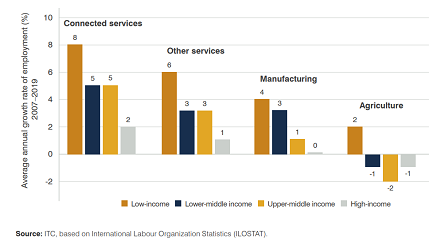A new report released by the International Trade Center (ITC) recommends for connected services (Transport and logistics, financial services, information and communication technologies (ICT), and business and professional services) as the key drivers for the growth of small businesses.
The report names them ‘connected services.’ Transport and logistics, financial services, information and communication technologies (ICT), and business and professional services contribute directly to economic growth and development with an increasing share of output, trade and jobs.
“They also contribute indirectly by making all firms more competitive and connecting them to global value chains and digital innovations. Connected services transform economies, directly and indirectly,” the report said.
“Small firms’ success depends partly on access to good-quality connected services. This is particularly true of small businesses in services sectors, which seem more export ready than those in manufacturing. And when small services firms are more competitive and trade more, they create better, higher paying jobs, notably for the women and youth that are disproportionately represented in the sector,” it said.
“Unfortunately, most small services firms in developing countries do not have easy access to connected services,” the report stated.
The report explores the nature of connected services, and the measures that companies, business support organizations and policymakers must take to help them flourish – to benefit all companies, foster more prosperous economies and build more inclusive societies.
What are connected services?
During the industrial revolution, the textiles and clothing industry led economic transformation. It was built upon new ways of organizing production, such as the apparel assembly line, and new technologies, such as the cotton gin.
In more recent times, the way of organizing production is the international supply chain, and technologies are digital. The connected services are at the center of these contemporary economic trends. Why is this so?
First, they are critical to supply chains, in which services now provide a greater share of value – a process known as ‘servicification.’ ¬ Second, they are frontrunners in using digital technologies, which enable services once viewed as local to be offered across borders.
Four services subsectors add higher value to exports and are more digitally intensive: financial services, ICT, transport and logistics, and business and professional services. Though all four are export and digitally intensive, the digitalization process drives ICT and finance in particular. Servicification of value chains embeds business and professional services and transport.
Why are connected services critical?
The rapidly increasing output, jobs and exports in connected services directly contribute to economic growth. Employment growth in connected services occurs across all levels of economic development, and especially in low-income countries that start from a lower base.
Between 2007 and 2019, employment in connected services grew by about 8% a year in low-income countries. In contrast, employment in manufacturing grew less than 4% per year during the same period, while growth in agriculture was only 2%. Digitalization and servicification trends are leading connected services to hire workers to meet growing demand.
Connected services also export more and are expanding fast. Whereas 26% of connected services firms surveyed by ITC export, the figure was 15% for firms in other services. Between 2005 and 2018, the value added to total exports by connected services grew faster than value added by manufacturing.
In LDCs, export growth of connected services outpaced that of other services between 2007 and 2019, and was faster than in the rest of the world. The indirect effects of connected services make them even more critical. By being the glue that connects firms within supply chains and spreading digital innovation, connected services increase the competitiveness of all firms.
Connected services source products and services from other sectors, stimulating economic activity that feeds into value chains, or backward linkages. Significantly, they also stimulate economic activity by supplying services to other sectors, creating forward linkages. When firms begin to outsource activities to specialized connected services firms, they become more competitive.
Companies that used good logistics services had better inventory management and more often delivered their goods on time, according to data from the ITC Competitiveness Survey. Similarly, those that were able to access high-quality banking services were 15 percentage points more likely to succeed in developing new products or processes.
Finally, firms with better access to the internet were much more likely to have information on potential buyers and suppliers than those without it. Moreover, companies in regions with competitive connected services tend to be more competitive, and companies that are more competitive have a higher propensity to export, ITC analysis shows. The share of companies that export was 25 percentage points higher when there were competitive connected services firms nearby, according to the report.

